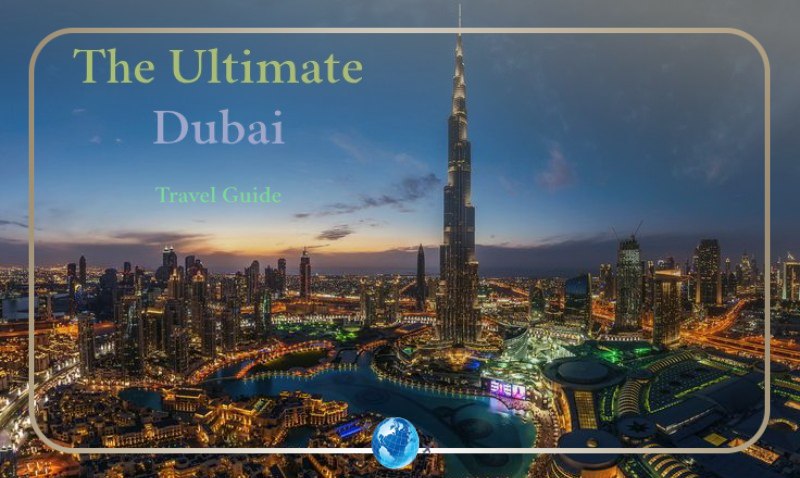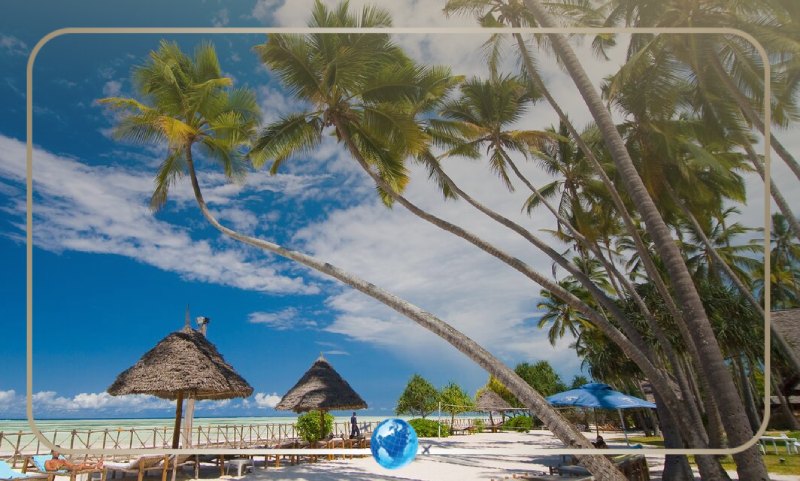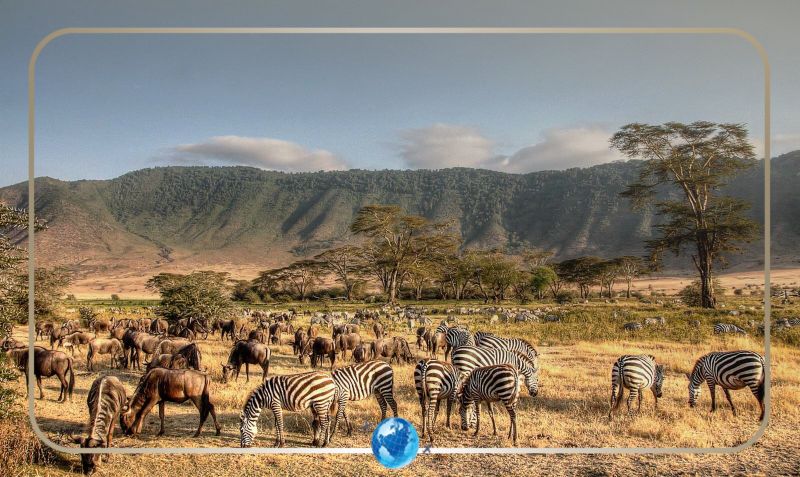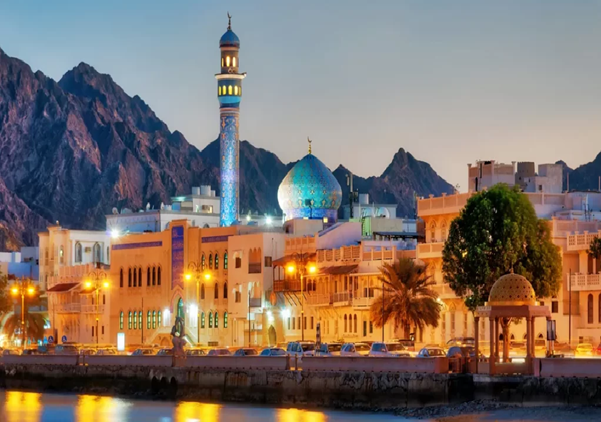Dubai, a dazzling metropolis in the United Arab Emirates, is a world-renowned destination that seamlessly blends tradition and modernity. With its iconic skyscrapers, luxurious resorts, vibrant nightlife, and rich cultural heritage, Dubai attracts millions of visitors each year. Whether you are looking for adventure, relaxation, shopping, or cultural experiences, Dubai offers something for everyone. For comprehensive information on flights, accommodations, and travel tips, visit East Express, a trusted source for planning your journey.
Best Time to Visit Dubai (Weather and Events)
Choosing the right time to visit Dubai can greatly enhance your experience, as the city's climate varies significantly throughout the year. Dubai’s weather is generally hot and arid, with distinct seasons that offer different opportunities for travelers.
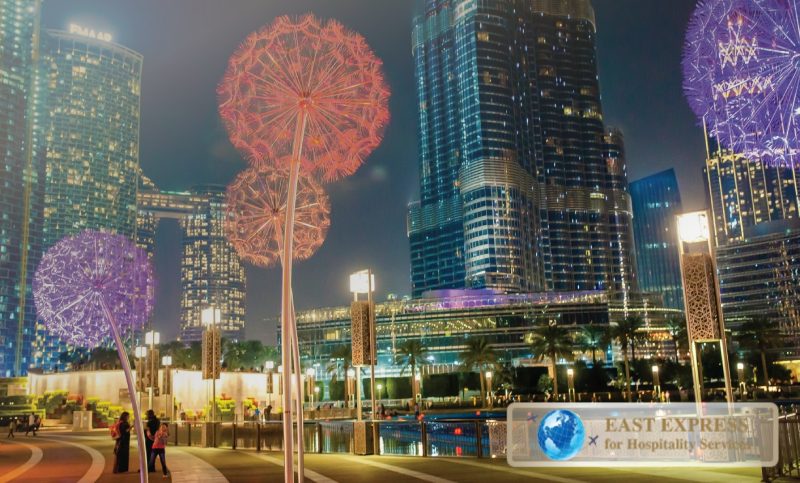
Summer (May – September): Extreme Heat
Dubai’s summer months are known for their scorching temperatures, often exceeding 40°C (104°F) and reaching highs of 45°C (113°F) or more. Humidity levels can also be intense, making outdoor activities challenging. During this period, most attractions, including shopping malls, indoor theme parks, and luxury hotels, offer air-conditioned environments to provide relief from the heat. If visiting in summer, it is advisable to stay hydrated, wear light clothing, and avoid outdoor excursions during peak afternoon hours.
Autumn (October – November): Transition to Milder Days
Autumn in Dubai marks a gradual decline in temperatures, ranging from 25°C to 35°C (77°F to 95°F). This season is ideal for outdoor activities such as desert safaris, beach outings, and sightseeing. Events such as the Dubai Fitness Challenge and outdoor food festivals begin to emerge, making it an exciting time for visitors.
Winter (December – February): The Best Season to Visit
Winter is widely considered the best time to visit Dubai. With daytime temperatures ranging from 15°C to 25°C (59°F to 77°F), this period offers the most comfortable weather for exploring the city. Outdoor dining, beach activities, and cultural experiences are at their peak. Major events such as the Dubai Shopping Festival and New Year’s Eve celebrations attract thousands of tourists, making it one of the busiest times in Dubai.
Spring (March – April): Blooming Beauty and Pleasant Weather
Spring in Dubai sees warming temperatures, ranging between 20°C and 30°C (68°F to 86°F). The pleasant weather allows for activities such as dhow cruises, garden visits, and city tours. Additionally, visitors can experience the Dubai Food Festival, offering an incredible culinary journey with international and local delights.
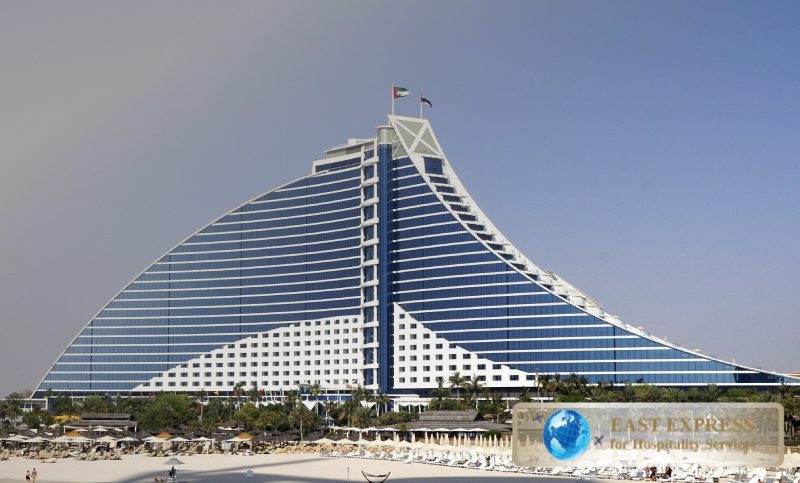
Dubai’s climate also brings occasional sandstorms, particularly in the hotter months, which may impact visibility and outdoor plans. Rainfall is minimal and mostly occurs between November and February, bringing a refreshing change to the otherwise dry climate. Regardless of the season, planning ahead and checking weather forecasts before traveling will ensure a more enjoyable experience.
For those seeking an unforgettable trip to Dubai, understanding the city’s seasonal variations can help determine the perfect time to visit. Whether you prefer the excitement of peak travel season or the tranquility of off-peak months, Dubai offers a unique experience throughout the year.
Visa Requirements for Travelers to Dubai
For travelers seeking a tourist visa to Dubai, there are several requirements and procedures to be aware of. Here's a detailed explanation of the visa requirements:
Purpose of Entry
The purpose of the visit determines the type and validity of the tourist visa for Dubai:
- Tourism: A tourist visa for Dubai is typically valid for 1 month.
- Business or Transit: If the purpose is business or transit, the visa can be valid for 48 to 96 hours.
- Group or Individual Applications: Tourist visas can be applied for both individually and in groups.
- Financial Sponsorship: Applicants are required to have a financial sponsor or a "kafil." This sponsor can be a UAE citizen, a company, or a migration agency.
- Accompanying minors: Individuals under 18 years of age must have an accompanying adult as their sponsor.
- Special Note: For a work visa, the sponsor can be a company or business partner.
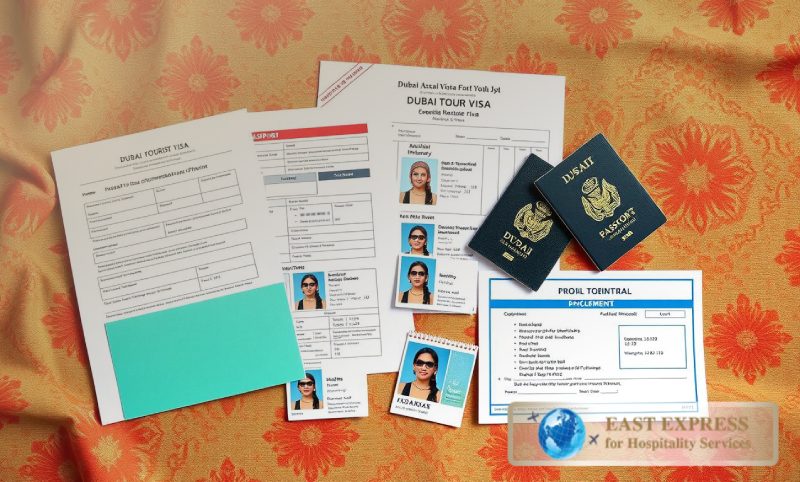
Required Documents for a Dubai Tourist Visa
Applicants need to submit several documents to apply for a tourist visa:
- Completed Tourist Visa Application Form
- Valid Passport
- Identity Documents (National ID and Birth Certificate)
- Photographs (Passport-sized)
- Travel Insurance Documentation
- Hotel Reservation and Flight Ticket
- Negative COVID-19 Test Results (if required)
- Personal Motivation Letter (explaining the reason for the trip)
- Previous Travel Documents (if applicable)
- Marriage Certificate (if applicable)
Important Note: Only the original documents need to be submitted. No copies are necessary.
Types of Dubai Tourist Visas
There are different types of tourist visas based on the duration of stay:
- 14-Day Tourist Visa
- 1-Month Tourist Visa
- 3-Month Tourist Visa
- 1-Month Multiple Entry Tourist Visa
- 3-Month Multiple Entry Tourist Visa
Visa Issuance Process
- Standard or Express Processing: Tourist visas for Dubai can be issued either on a regular or an expedited basis.
- Express Visa: Typically processed within 24 to 48 hours, and issued within 1 to 3 days.
- Standard Visa: Processing time can take between 3 to 7 days, with the visa issued within 7 to 10 business days.
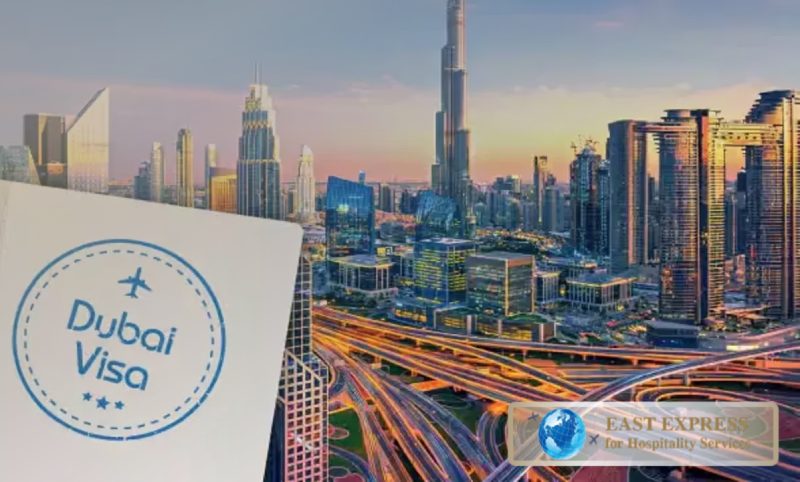
Dubai Visa Fees
Visa fees vary based on the type of visa and the duration of stay:
- 14-Day Tourist Visa: 340 AED
- 1-Month Tourist Visa: 380 AED
- 3-Month Tourist Visa: 850 AED
- 21-Day Work Visa: 455 AED
- 1-Month Work Visa: 655 AED
- 48-Hour Transit Visa (only for waiting for the next flight): Free
- 96-Hour Transit Visa: 170 AED
Application Process
To apply for a Dubai tourist visa, applicants must go through an immigration agency or travel agency, as applications cannot be submitted directly to the UAE embassy. The process can be done either in-person or online:
- Download the Dubai tourist visa application form online.
- Fill out the visa application form.
- Print out the completed form.
- Submit the required documents, including the filled application form.
- Submit the documents to the relevant agency or immigration department.
Once the visa is approved and issued, the applicant will receive the visa details via email.
Important Note: For those applying in-person, the application can be submitted through the General Directorate of Residency and Foreigners Affairs (GDRFA) website, where the required documents should be uploaded.
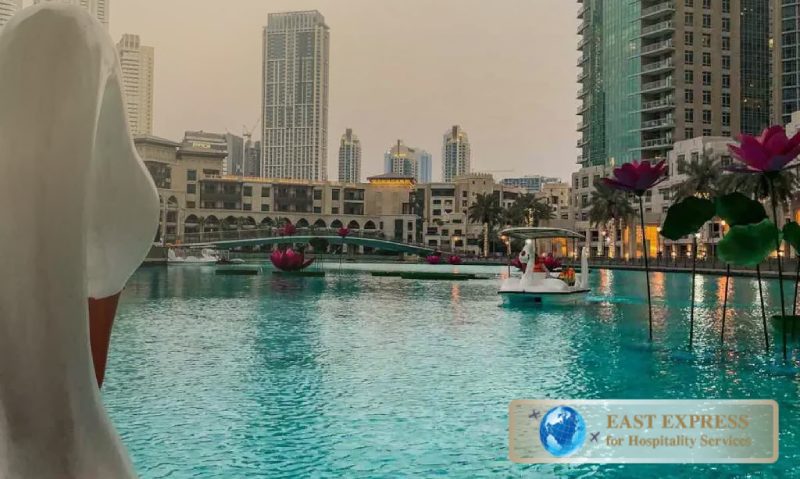
This comprehensive process ensures that travelers can visit Dubai for tourism purposes while complying with the necessary legal requirements.
Top Neighborhoods to Stay in Dubai
Dubai is one of the most attractive cities in the world, offering a wide range of residential neighborhoods to suit different lifestyles and preferences. Here’s a detailed guide on the top neighborhoods to stay in Dubai:
1. Dubai Marina
Dubai Marina is considered one of the best areas for expats, especially for those who prefer a vibrant, modern lifestyle. This district features tall residential towers offering stunning views of the Dubai Marina waterfront. The area is home to various restaurants, cafes, and shops, making it ideal for young professionals and couples. The beach in Dubai Marina adds to its appeal, making it an excellent location for those who enjoy a coastal lifestyle.
2. Downtown Dubai
Downtown Dubai is the city's central hub, home to some of the most iconic landmarks, including the Burj Khalifa, Dubai Mall, and the Dubai Fountain. This area offers a bustling environment with easy access to transport, shopping, and dining. However, the downside is the heavy traffic, especially during evenings, and the relatively high cost of living. It's a top choice for those who want to be close to the city's major attractions and amenities.
3. Mirdif
Mirdif is a well-established residential neighborhood, popular among Iranian expatriates. Located behind Dubai Airport, this area offers a peaceful living environment and is known for its security, with walls around the neighborhood and a single entrance. The area provides good access to local restaurants, shopping centers, and entertainment options. Compared to areas like Downtown Dubai and Business Bay, Mirdif has more affordable housing options.
4. Arabian Ranches
Arabian Ranches is a suburban residential area located away from the hustle and bustle of the city center. It’s perfect for those who prefer a quieter, more relaxed lifestyle. The area features villa-style homes and offers excellent facilities such as cycling paths, walking tracks, golf courses, and equestrian clubs. However, living in Arabian Ranches requires a personal vehicle, as it’s located further from Downtown Dubai. This neighborhood is ideal for families looking for space and tranquility.
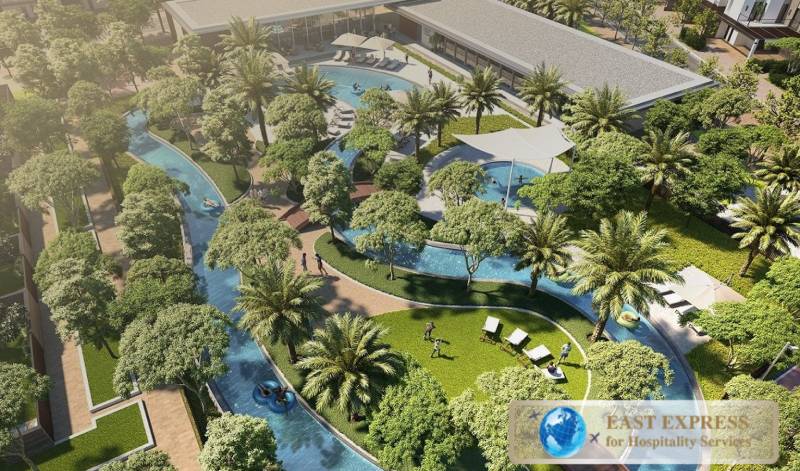
5. Jumeirah Beach Residence (JBR)
JBR is one of Dubai’s most luxurious neighborhoods, with beachfront properties and stunning views of the sea. It is known for its high-end living, vibrant atmosphere, and cultural diversity. JBR features numerous cafes, restaurants, and entertainment venues, making it a popular choice for those who enjoy an active social life. The area is also home to some of the best 5-star hotels in Dubai, making it ideal for both residents and tourists alike.
6. Al Barsha
Al Barsha is a residential area that provides excellent accessibility to major parts of the city, including Dubai Marina and Downtown Dubai. It’s known for its family-friendly environment, with several schools, malls, and parks in the area. Al Barsha is ideal for families, especially those with children, due to the availability of educational institutions and recreational activities like Ski Dubai. It’s also more affordable compared to some of the more high-end areas like Downtown Dubai and Business Bay.
7. Deira
Deira is one of the oldest and most famous neighborhoods in Dubai. Located near Sharjah, Deira offers good access to Dubai’s main tourist attractions and entertainment venues. It is known for its rich history and vibrant markets, such as the Gold Souk. The cost of living in Deira is more affordable compared to other areas, and public transport is easily accessible, making it an attractive option for those who don't own a car.
8. Business Bay
Business Bay is a top choice for those working in Dubai. It is a commercial and residential district offering a mix of office buildings and luxurious residential properties. The area is known for its modern architecture, wide roads, and easy access to major transport systems like the Dubai Metro. It’s a hub for professionals working in the business and financial sectors. However, it’s also one of the most expensive areas in Dubai.
Dubai offers a diverse range of neighborhoods, each catering to different lifestyles. Whether you’re looking for a luxurious beachfront property, a peaceful suburban home, or a vibrant city center experience, Dubai has something to offer everyone. The best area for you depends on your budget, preferences, and lifestyle needs. Popular neighborhoods include Dubai Marina, Downtown Dubai, Jumeirah Beach Residence, Mirdif, Arabian Ranches, and Business Bay.
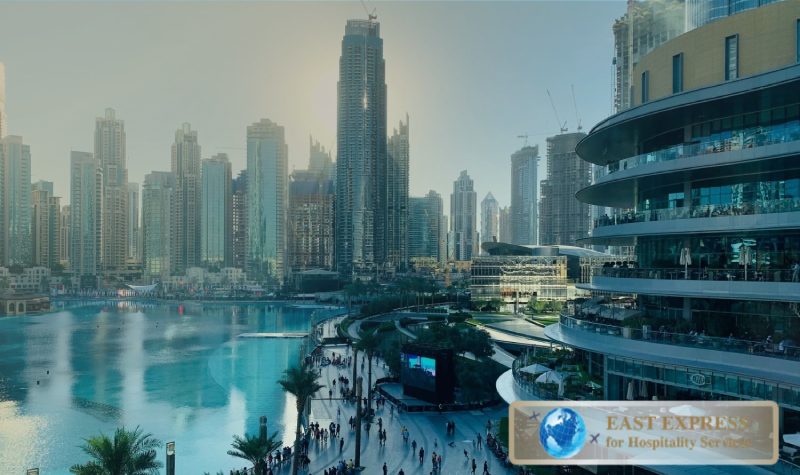
Packing Essentials for Your Dubai Trip
When preparing for your Dubai trip, packing smartly ensures a smooth and comfortable experience. Here are the key essentials you’ll need:
- Appropriate Clothing: Dubai has a hot desert climate, so lightweight, breathable clothing is essential, especially during the summer months. However, modest clothing is expected in public places,particularly in religious sites like mosques. Women should carry shawls or scarves for covering the shoulders and head in such places. In luxury hotels, beach resorts, and malls, casual or resort wear is appropriate.
- Sunscreen and Sunglasses: The sun in Dubai can be intense, even in the cooler months. Sunscreen with high SPF protection is crucial to avoid sunburn. Sunglasses with UV protection are also important to shield your eyes from the bright sunlight.
- Comfortable Footwear: Dubai is a city best explored on foot or by public transport, so comfortable shoes are a must. Consider packing sandals for the beach and more supportive shoes for walking tours.
- Power Adapters: Dubai uses the British-style Type G power plug (three rectangular prongs), so be sure to bring the appropriate travel adapter for your electronics.
- Medication and Health Kit: While Dubai has excellent healthcare facilities, it's advisable to carry any personal medications with you, along with a basic health kit for minor ailments like headaches or upset stomachs. If you’re traveling with prescription medications, carry the doctor's prescription and check the regulations for bringing them into the country.
- Swimwear: Dubai is home to beautiful beaches and luxury hotel pools. Be sure to pack swimwear, but remember that swimsuits are for the pool or beach only. It’s not acceptable to wear them in public places.
- Light Jacket: While Dubai is hot for most of the year, the indoor areas, especially malls, hotels, and airports, can be quite chilly due to air conditioning. A light jacket or sweater will keep you comfortable indoors.
- Cash and Credit Cards: While credit and debit cards are widely accepted, it’s still a good idea to carry some local currency (AED) for smaller purchases and tips.
Common Tourist Mistakes to Avoid in Dubai
- Disrespecting Local Customs and Culture: Dubai is a modern, cosmopolitan city, but it’s still rooted in Islamic traditions. Tourists should be respectful of local customs, especially when it comes to dress codes and public behavior. Avoid public displays of affection, and always dress modestly when in public spaces.
- Not Staying Hydrated: Dubai can get incredibly hot, especially during the summer months. Tourists often underestimate the heat and forget to drink enough water. Always carry a bottle of water with you to stay hydrated and avoid heatstroke.
- Ignoring Public Transportation Etiquette: The metro, buses, and taxis in Dubai are efficient, but there are certain rules and etiquettes to follow. For instance, priority seating is designated for elderly, pregnant, or disabled passengers. Avoid talking loudly or using your phone in public transport.
- Overlooking the Strict Drug Laws: Dubai has a zero-tolerance policy when it comes to drugs, and even possession of a small amount can result in severe punishment. Ensure that you’re aware of what substances are legal and illegal in Dubai before your trip.
- Overpacking or Underpacking: Some tourists overpack, thinking they need an abundance of clothing for every occasion, while others underpack, forgetting essentials like sun protection. Plan carefully based on the climate and activities you’ll be doing.
- Overestimating Walking Distances: Although Dubai appears compact on a map, distances between major attractions like malls, hotels, and beaches can be longer than expected. Use taxis or the metro to avoid walking long distances under the hot sun.
Conclusion: Travel to Dubai
Dubai is a captivating destination blending modernity with tradition, offering luxury, adventure, and cultural experiences. Whether you're planning to shop in world-class malls, explore iconic landmarks like the Burj Khalifa, relax on pristine beaches, or indulge in vibrant nightlife, Dubai has something for every type of traveler. By packing wisely and being mindful of cultural norms, you’ll enjoy a seamless and enjoyable stay in one of the world’s most exciting cities.
Frequently Asked Questions
What is the best time to visit Dubai?
The best time to visit Dubai is from November to March when the weather is more temperate. The summer months (June to August) can be extremely hot, with temperatures reaching over 40°C (104°F).
Do I need a visa to travel to Dubai?
Most nationalities can get a tourist visa on arrival in Dubai, typically valid for 30 days. However, it’s best to check with the UAE embassy or consulate in your country for the latest visa requirements.
Is Dubai a safe destination for tourists?
Yes, Dubai is considered one of the safest cities in the world for tourists. The city has very low crime rates, and the authorities take security very seriously. Always follow local laws and guidelines to ensure a safe visit.
Can I drink alcohol in Dubai?
Alcohol is available in licensed hotels, bars, and restaurants. However, it is illegal to drink in public places, and drinking in excess or being drunk in public can result in fines or legal trouble.




